Special anniversary looms for swimming’s 1960 Olympic Games heroine Anita Lonsbrough
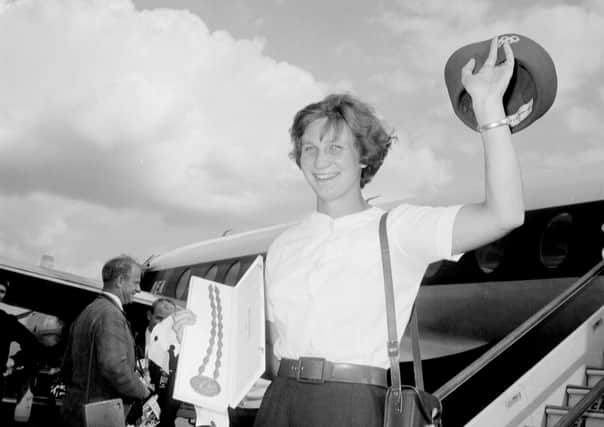

The underdog going into the final of the 200 metres breaststroke at the Rome Olympics, she set a new world record to deny her great rival, Wiltrud Urselmann.
Lonsbrough appeared to have seen off her great German rival, and existing world-record holder, entering the defining final lengths before Urselmann rallied amid deafening noise.
Advertisement
Hide AdAdvertisement
Hide AdThe most satisfying moments of her career, they were also the hardest – she felt she had won the race and had to win it again in the open-air Stadio Olimpico del Nuoto, an inspiring venue.
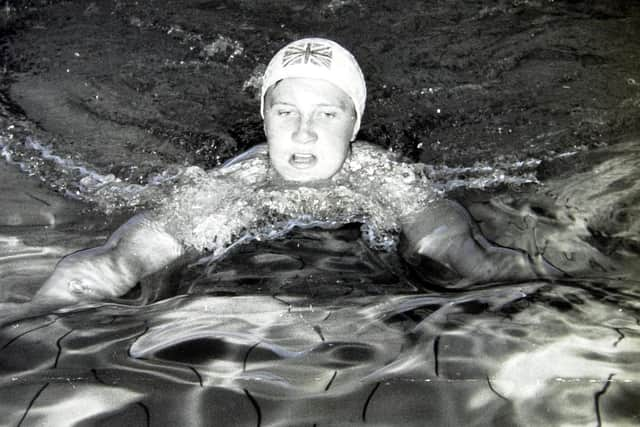

“It was a great honour at the time and is something that was important in my life at the time,” the understated Lonsbrough told The Yorkshire Post in an exclusive interview ahead of this Thursday’s landmark.
“I just feel that I have had three lives. A swimming career, a working career (as a journalist for the Daily Telegraph and BBC commentator) and a retirement where my husband and I do charity work.”
Her husband is, of course, Hugh Porter, a cycling champion and long-time commentator, whom she met on the plane to Tokyo for the 1964 Olympics and married the following year in Huddersfield.
Advertisement
Hide AdAdvertisement
Hide AdPatrons of Radio Wulfrun at New Cross Hospital in Wolverhampton close to where they live, they are also involved with a school to help teach children about the importance of the countryside.
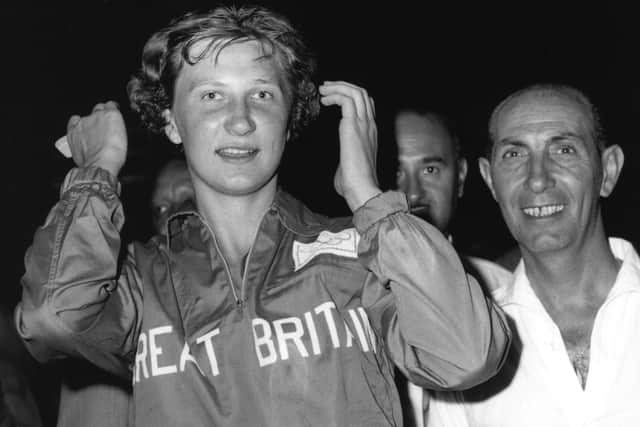

Lonsbrough jokes that she won a gold medal in Rome, and a husband four years later at the Tokyo Games where she was Great Britain’s flag-bearer.
But such modesty does a disservice to an accidental breaststroker who had to take unpaid leave to train for Rome – a contrast to today’s Lottery-funded competitors.
Born in York where her mother Maud would swim in races in the River Ouse, Lonsbrough learned to swim in India where her father Stanley, a Sergeant Major in the Coldstream Guards, was stationed.
Advertisement
Hide AdAdvertisement
Hide AdIt was only when the family returned to Yorkshire that Lonsbrough’s prowess in the pool began to show at Harrogate and then in events at the former Olympic-sized pool in Leeds.
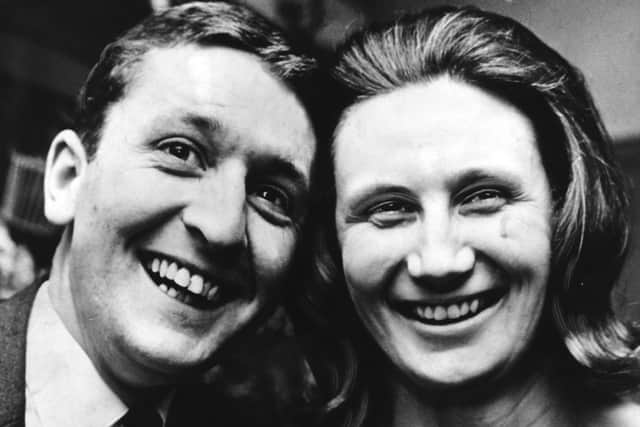

Later a pupil at St Joseph’s Catholic College, Bradford, the then teenager preferred freestyle – it was, she said, the fastest of the four swimming disciplines – before fate intervened.
She had entered another event near her family’s Huddersfield home. “I had entered in the freestyle, backstroke and butterfly,” she recalled. “But when I arrived. I found I was the only competitor for the butterfly so it was scrapped. The organisers asked if I’d like to swim in the breaststroke instead. I just took to it naturally.”
It was a life-changing decision. Within a year, she was winning gold in the 220 yards breaststroke at the 1958 British Empire and Commonwealth Games and silver at the same year’s European Championships.
Advertisement
Hide AdAdvertisement
Hide AdNow Lonsbrough had another challenge. She had started work as a clerk in the Treasurer’s Department at Huddersfield Borough Council – the work involved processing local rates.
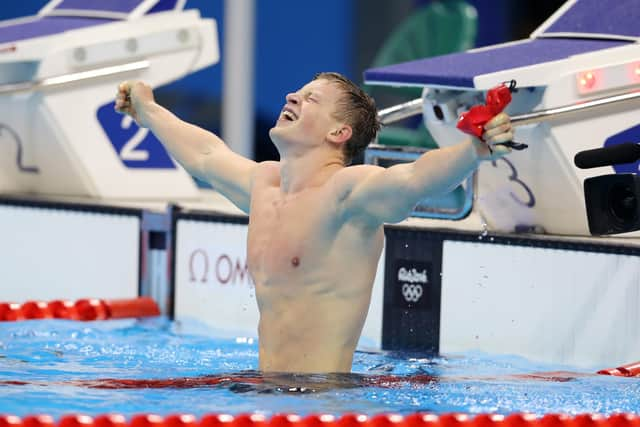

Yet, while she recalls sessions at the old Ramsden Street and Cambridge Road baths which were half the size of the Olympic 50-metre pools, her employers were reluctant to give her time off.
“In the build-up to Rome, they stopped my money when I asked for time off,” disclosed Lonsbrough without a trace of self-pity. “Fortunately, my parents supported me. It was just part of life and how it was in those days and I accepted it.”
Yet, heading to Italy, Lonsbrough did not feel any pressure of expectation.
Advertisement
Hide AdAdvertisement
Hide Ad“Urselmann was the favourite and she had broken my world record earlier that year,” she said. “I felt the pressure was on her and not me.”
The heats saw both competitors break the previous Olympic record – Urselmann qualifying fastest and the Yorkshirewoman second quickest. Lonsbrough was pleased – she never swam at her best in mornings.
Her coach, Harry Chambers, had also worked on relaxation techniques. Lonsbrough ensured a good night’s sleep before the final – Britain’s athletics team had still to arrive in Rome so she used one of their empty rooms to ensure that she was not disturbed.
She recalls a relaxing day in the build-up to the final while Urselmann looked tense in the final countdown, pacing up and down.
Advertisement
Hide AdAdvertisement
Hide AdInto the pool and the German, as expected, set the pace but Lonsbrough recalls her own inner calmness and “absolute confidence” in her tactics.
She knew she would be at her strongest in the second half of the race, but was surprised to be in the lead halfway through the last of four lengths.
Lonsbrough’s presence appeared to spur Urselmann.
“She was fighting for the gold, too. I didn’t realise I had won until I looked up and saw the giant scoreboard,” she added.
Olympic champion, Lonsbrough’s winning time – two minutes and 49.5 seconds – was a new world record as she became the third British woman, after Lucy Morton (1924) and Judith Grinham (1956), to win individual gold on the greatest sporting stage of all. That it was nearly 50 years before another swimmer, Rebecca Adlington (2008), joined this elite group is another important indicator of this historic swim’s magnitude.
Advertisement
Hide AdAdvertisement
Hide AdOne of just two British gold medal winners at Rome, the other being 50km racewalker Don Thompson, she would be later feted in Huddersfield after spending a few days with her father at the Scarborough Cricket Festival.
By 1964, Lonsbrough felt her career was coming to an end and she was unplaced at Tokyo as a new life – as a wife and journalist – dawned.
She loved working with the late Peter Jones, and then Bob Ballard, for BBC Radio and was in Beijing when Adlington joined her ‘club’ by winning two golds.
She also tells the story about how her friend Mel Marshall, a respected coach, told her to keep an eye out for one of her proteges.
Advertisement
Hide AdAdvertisement
Hide Ad“She said ‘Watch this lad, he’s good’.” The name? Adam Peaty, now one of swimming’s all-time greats (and 2016 Olympic champion).
Lonsbrough, 79, says Peaty’s strength and speed has taken the discipline to another level and that he’s a poster boy for Lottery funding. “That’s their job and they get all the help they need, and 50-metre pools,” she added.
“It’s a different sport. When I competed, you fitted it in around work and your school work. Now it’s their job. But I worked hard – that’s how it was – and it was nice to achieve the things I did.”
Both then – and now.
Made to wait for top BBC sporting gong
ANITA Lonsbrough has another landmark to her name – the first female competitor to win the coveted BBC Sports Personality of the Year.
Advertisement
Hide AdAdvertisement
Hide AdThe irony is that she won the award in 1962 and not her Olympic year of 1960 when she was third behind the showjumper David Brooke and long-distance walker Don Thompson.
“Don and I were the only two gold medal winners from Rome and Don was not very happy when it was announced that David had won,” recalled Lonsbrough.
Her triumph in 1962 came after she had won three gold medals at the British Empire and Commonwealth Games in Perth as well as winning the 200 metres breaststroke at the European Championships and setting two world records.
Lonsborough, however, was the second swimmer to have won the BBC honour since its inception in 1954 – Ian Black had prevailed in 1958.
Advertisement
Hide AdAdvertisement
Hide Ad“It was hardly surprising that swimming was prominent because the BBC had a contract to screen one major swimming meeting a month, so we were never far from viewers’ attention,” she observed.
No swimmer has won the award subsequently, though Olympic heroes David Wilkie (1976), Adrian Moorhouse (1988) and Rebecca Adlington (2008) have all been placed.
Support The Yorkshire Post and become a subscriber today.
Your subscription will help us to continue to bring quality news to the people of Yorkshire. In return, you’ll see fewer ads on site, get free access to our app and receive exclusive members-only offers.
So, please - if you can - pay for our work. Just £5 per month is the starting point. If you think that which we are trying to achieve is worth more, you can pay us what you think we are worth. By doing so, you will be investing in something that is becoming increasingly rare. Independent journalism that cares less about right and left and more about right and wrong. Journalism you can trust.
Thank you, James Mitchinson. Editor.
Comment Guidelines
National World encourages reader discussion on our stories. User feedback, insights and back-and-forth exchanges add a rich layer of context to reporting. Please review our Community Guidelines before commenting.